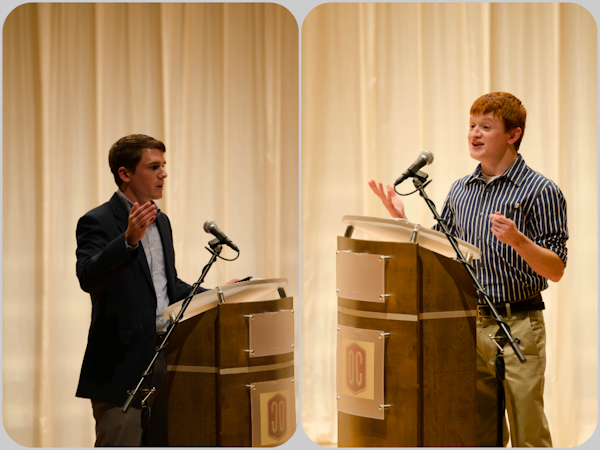Photo by: Will Gentry
On Thursday, Nov. 14, Oklahoma Christian University held its biannual student debates where the discussion involved current political issues around the world.
According to senior political science major and veteran debater, Afton Paris, the debates are intended to produce a well-informed, well-rounded student body.
“The debates are an opportunity for students of the OC community to hear their peers discuss many of the issues that face our society today,” Paris said. “It is important for people to understand these issues if society is to function well, and these debates are a great platform to see and hear different perspectives.”
Each participant is a current Oklahoma Christian student. Participation is voluntary and anyone who wished to be involved in the debate was allowed to join. Most participants are political science majors, but there are a few students from other areas of study.
“[The debaters are] simply people who have indicated an interest either to myself or [Dr.] Huston, our faculty sponsor,” senior political science major and debate organizer Christian Asbill said. “Most of the students are from either the political science or history department, because Pi Sigma Alpha, the National Political Science Honor Society, is the student organization that hosts the debate. We have quite a few students outside of [political science] as well.”
According to Paris, the debates are an excellent way for students who hope to enter a public arena to hone their skills prior to beginning their careers.
“From my perspective, the debates are a chance for me to develop my critical thinking and public speaking skills in preparation for a possible career in law or in public policy,” Paris said. “Whatever the career, public speaking and debate encourage the development of skills that can prove invaluable in our increasingly interconnected and social society.”
The setup of the debates allows observers the opportunity to interact with the debaters.
“After all of the debaters have had an opportunity to [present their argument] there will be a brief Q-and-A session where audience members may ask specific debaters or pairs of debaters questions about their position,” Asbill said.
The student debates are held biannually, both in the fall and spring semesters. Debate topics include a variety of current issues.
“In past debates we’ve discussed everything from women’s roles in the church to minimum wage requirements and women in active combat roles,” Asbill said. “Often times, what usually happens is our fall debates will focus more on political issues and our spring debates will be reserved with more philosophical issues. This is usually done to coincide with election seasons and things like that.”
On the agenda for this semester’s debate are many subjects from both American and international politics.
“This semester will feature a variety of topics, including the Defense of Marriage Act (DOMA), the possibility of Iran developing nuclear weapons, the government deficit and intervention in Syria,” Paris said.
Students participating in the debates receive their topics about a month in advance to ensure that the issues discussed will be recent enough to be applicable to the audience.
“They’ve had a fairly decent amount of time to prepare their arguments,” Asbill said. “We notify them a short enough amount of time ahead, so that by the time the debate takes place, the topics they are discussing will still be relevant topics that their classmates and anybody else in attendance can be interested in hearing discussed.”
Paris says that preparation for the debates requires constant renewal and amending of information.
“I prepare for these debates by doing my research and keeping current on any developments in whatever area I am to discuss,” Paris said. “The debates are an exercise in speaking off the cuff, so the best way to prepare is simply to know the facts.”
Perhaps the most challenging aspect of the student debates is the fact that each debater is assigned not only each topic, but also their designated stance on each issue.
“The students who debate are assigned their topics and they’re also assigned their position,” Asbill said. “One thing we like to stress is that the position that a student argues in this debate is the one that was assigned to them and does not necessarily reflect that student’s own opinion on the topic.”
According to Asbill, the ability to argue both sides of a topic equips debaters with certain skills.
“One thing we try to teach with argumentative debate is that you have to be able to argue any side of an issue, regardless of whether you believe it or not,” Asbill said. “Especially on topics that are very divisive, particularly along an ideological spectrum, we emphasize that these students are debating a position they were given, not necessarily their personal opinion.”














Be First to Comment